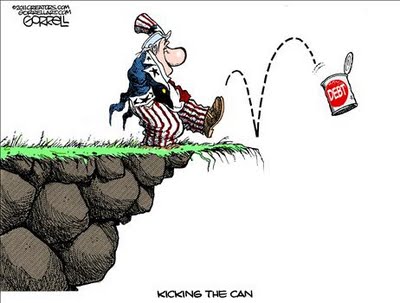– The High Price of Delaying the Default (Ludwig von Mises Institute, Feb 26, 2014):
Credit is a wonderful tool that can help advance the division of labor, thereby increasing productivity and prosperity. The granting of credit enables savers to spread their income over time, as they prefer. By taking out loans, investors can implement productive spending plans that they would be unable to afford using their own resources.
The economically beneficial effects of credit can only come about, however, if the underlying credit and monetary system is solidly based on free-market principles. And here is a major problem for today’s economies: the prevailing credit and monetary regime is irreconcilable with the free market system.
At present, all major currencies in the world — be it the US dollar, the euro, the Japanese yen, or the Chinese renminbi — represent government sponsored unbacked paper, or, “fiat” monies. These monies have three characteristic features. First, central banks have a monopoly on money production. Second, money is created by bank lending — or “out of thin air” — without loans being backed by real savings. And third, money that is dematerialized, can be expanded in any quantity politically desired.
A fiat money regime suffers from a number of far-reaching economic and ethical flaws. It is inflationary, it inevitably causes waves of speculation, provokes bad investments and “boom-and-bust” cycles, and generally encourages an excessive built up of debt. And fiat money unjustifiably favors the few at the expense of the many: the early receivers of the new money benefit at the expense of those receiving the new money at a later point in time (“Cantillon Effect”).
One issue deserves particular attention: the burden of debt that accumulates over time in a fiat money regime will become unsustainable. The primary reason for this is that the act of creating credit and money out of thin air, accompanied by artificially suppressed interest rates, encourages poor investments: malinvestments that do not have the earning power to service the resulting rise in debt in full.
Governments are especially guilty of accumulating an excessive debt burden, greatly helped by central banks providing an inexhaustible supply of credit at artificially low costs. Politicians finance election promises with credit, and voters acquiesce because they expect to benefit from government’s “horn of plenty.” The ruling class and the class of the ruled are quite hopeful that they can defer repayment to future generations to sort out.
However, there comes a point in time when private investors are no longer willing to refinance maturing debt, let alone finance a further rise in indebtedness of banks, corporations, and governments. In such a situation, the paper money boom is doomed to collapse: rising concern about credit defaults is a deadly enemy to the fiat money regime. And once the flow of credit dries up, the boom turns into bust. This is exactly what was about to happen in many fiat currency areas around the world in 2008.
A fiat money bust can easily develop into a full-scale depression, meaning failing banks, corporations filing for bankruptcy, and even some governments going belly up. The economy contracts sharply, causing mass unemployment. Such a development will predictably be interpreted as an ordeal — rather than an economic adjustment made inevitable by the ravages of the preceding fiat money boom.
Everyone — those of the ruling class and those of the class of the ruled — will predictably want to escape disaster. Threatened with extreme economic hardship and political desperation, their eyes will turn to the central bank which, alas, can print all the money that is politically desired to keep overstretched borrowers liquid, first and foremost banks and governments.
Running the electronic printing press will be perceived as the policy of the least evil — a reaction that could be observed many times throughout the troubled history of unbacked paper money. Since the end of 2008, many central banks have successfully kept their commercial banks afloat by providing them with new credit at virtually zero interest rates.
This policy is actually meant to make banks churn out even more credit and fiat money. More credit and money, provided at record low interest rates, is seen as a remedy of the problems caused by an expansion of credit and money, provided at low interest rates, in the first place. This is hardly a confidence-inspiring route to take.
It was Ludwig von Mises who understood that a fiat money boom will, and actually must, ultimately end in a collapse of the economic system. The only open question would be whether such an outcome will be preceded by a debasement of the currency or not:
The boom cannot continue indefinitely. There are two alternatives. Either the banks continue the credit expansion without restriction and thus cause constantly mounting price increases and an ever-growing orgy of speculation, which, as in all other cases of unlimited inflation, ends in a “crack-up boom” and in a collapse of the money and credit system. Or the banks stop before this point is reached, voluntarily renounce further credit expansion and thus bring about the crisis. The depression follows in both instances
A monetary policy dedicated to averting credit defaults by all means would speak for a fairly tough scenario going forward: depression preceded by inflation. This is a scenario quite similar to what happened, for instance, in the fiat money inflation in eighteenth-century France.
According to Andrew Dickson White, France issued paper money
seeking a remedy for a comparatively small evil in an evil infinitely more dangerous. To cure a disease temporary in its character, a corrosive poison was administered, which ate out the vitals of French prosperity.
It progressed according to a law in social physics which we may call the “law of accelerating issue and depreciation.” It was comparatively easy to refrain from the first issue; it was exceedingly difficult to refrain from the second; to refrain from the third and with those following was practically impossible.
It brought … commerce and manufactures, the mercantile interest, the agricultural interest, to ruin. It brought on these the same destruction which would come to a Hollander opening the dykes of the sea to irrigate his garden in a dry summer.
It ended in the complete financial, moral and political prostration of France — a prostration from which only a Napoleon could raise it.


